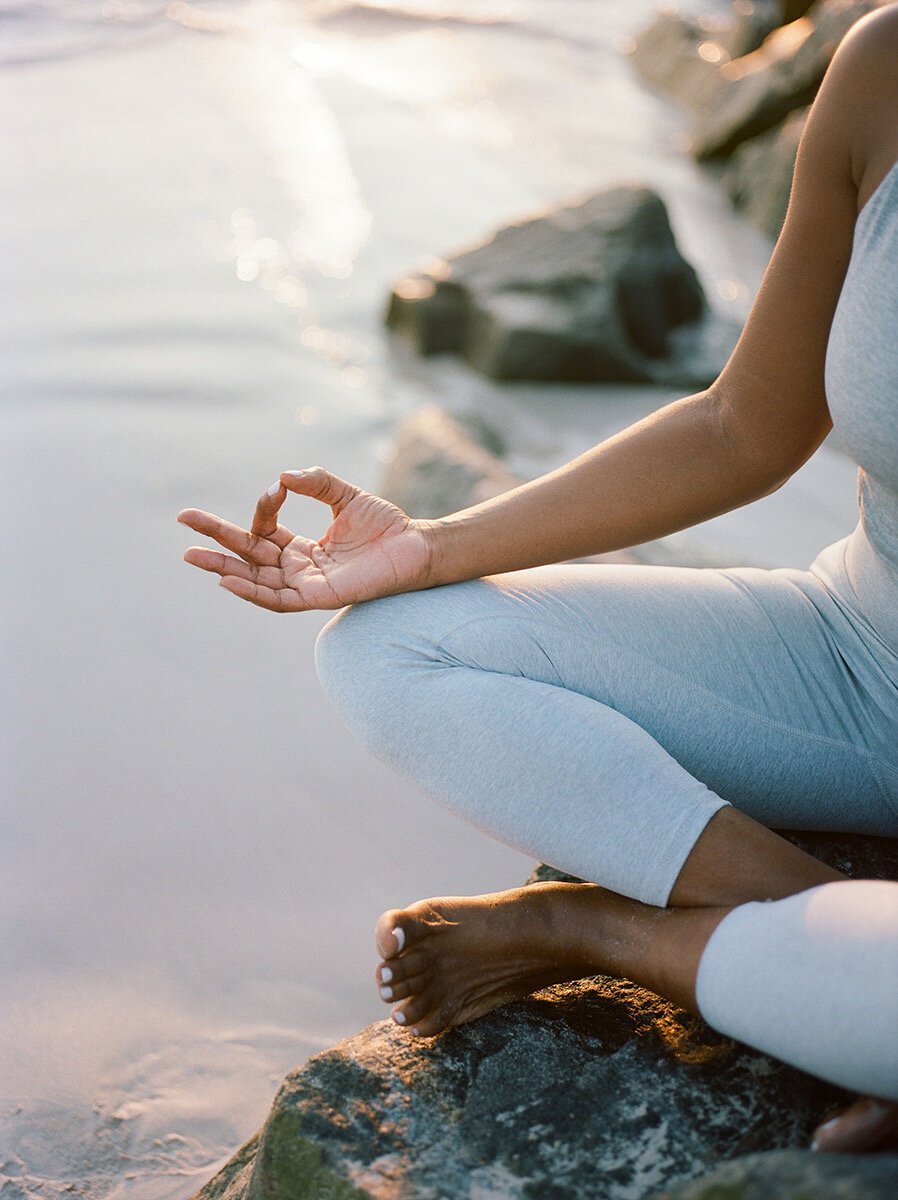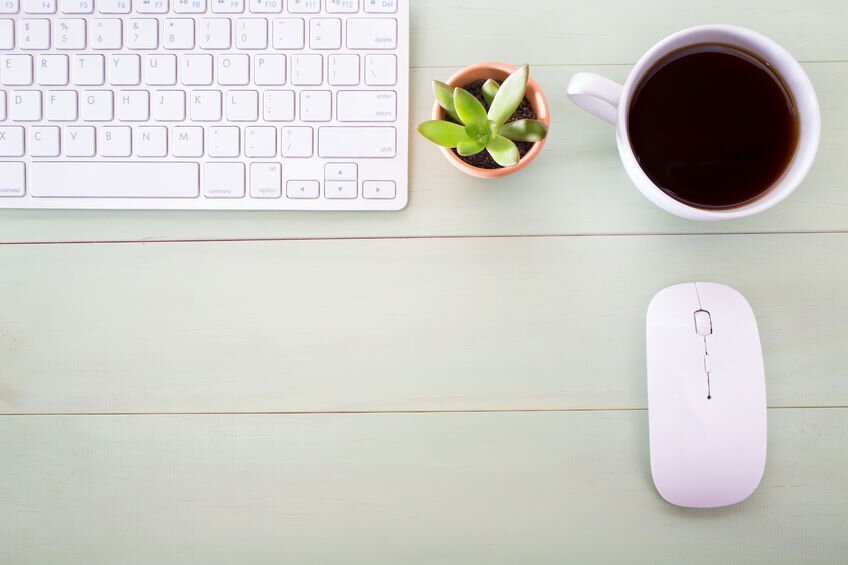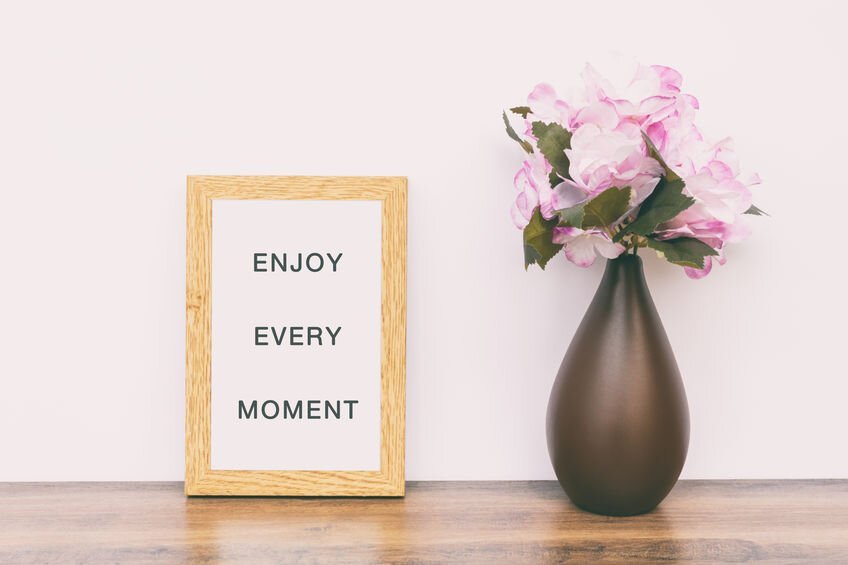Blog
Get Grounded. Feel Balanced. Live the Life You Want.
Yoga and mindfulness learnings, teachings and tips & tricks to support you through this thing called life.
Here’s How Physical Activity Can Help Ease Anxiety
I am the first to admit that I don’t really like moving. If I had a choice, I would prefer to sit over pretty much anything else. Napping is my favorite. And, even after realizing all that, I know that I feel more balanced and at ease after I move my body in some way. And that sitting with my thoughts sometimes just feeds my anxiety and makes things a bit worse.
I also have friends that are constantly exercising, which can lead to physical pain, injury or an over stimulated mind. These friends tend to avoid their anxiety by working out all the time.
So how do we find the balance? And why is moving so important anyway? Today I’m sharing the importance of moving your body and how to find the right balance so that you feel confident to better manage your anxiety using your own movement routine.
40 Supportive Quotes to Help Ease Your Anxiety
There’s something about reading motivational quotes, especially when I am feeling anxious, that help put things into perspective and calm my overthinking mind. They also act as little reminders that “this too shall pass” and that I can overcome anything.
Here is a list of my favorite quotes about overcoming anxiety. I hope these provide the motivation, encouragement and support you need to feel a little less anxious and a little more confident to take on whatever life throws at you.
How Concentration Can Ease Your Anxiety
Not only is our world full of distractions, but for those of us that struggle with anxiety, our overthinking minds fill up with intrusive thoughts about the past or future that have nothing to do with the task at hand, leaving us feeling scattered, forgetful and frustrated! And if you are anything like me, you might even beat yourself up for not being able to concentrate. Or at least that’s how I used to handle my lack of focus and concentration. But I’m here to tell you the good news! You can learn to cultivate a more concentrated mind, even when it feels almost impossible, so you can reduce your anxiety in order to feel more calm, creative and confident in your life.
Are You Tired of Over-Apologizing? Here’s How Mindfulness Can Help.
If I had $1 for each time I said, “I’m sorry”, I would be a multimillionaire. I am an over-apologizer. I have been most of my life and until recently I thought I was apologizing to be polite and compassionate toward others. And although those are great reasons to apologize on occasion, over-apologizing because of my anxiety has become an involuntary response and it usually has nothing to do with me actually feeling remorse. If you can relate, I’m here to tell you there is good news! We can absolutely do something about this! After reading today’s blog, you’ll learn how anxiety impacts your need to apologize and how mindfulness techniques can help, which will give you the confidence you need to stop over-apologizing and reduce your anxiety.
The Practice of Loving-Kindness: Reduce Your Anxiety and Help Heal The World
Our world is a pretty chaotic place right now. As a society, we seem to be more divided than ever.
Whether the topic is politics, the pandemic, the vaccine or social justice issues, opinions from both sides are very high and heated. People can no longer have a conversation with someone they disagree with for fear of being judged or canceled. Family and friends are divided and some no longer talk to each other. In general, we seem to have lost the ability as a society to see the good in people and to be open to another’s opinion and perspective. And there doesn’t seem to be anything we can do about it. BUT- there is! We can practice gratitude. In today’s blog I’m sharing how a gratitude practice can begin to shift your own negativity bias so you can reduce your anxiety, improve social connections and feel happier in life.
Here’s My Exact Guide to Reduce Anxiety with Meditation
When I first started my yoga practice in 2000, I had NO desire to meditate. In fact, I didn’t think it was possible for someone with anxiety to completely quiet my mind. Each time I tried to meditate, I got frustrated because my overthinking mind would kick into gear and I didn’t think I was “doing it right.” So, eventually I stopped trying.
Has this happened to you?
If so, I’m happy to share that since 2016, when I was forced to learn how to meditate as part of an advanced yoga teacher training certification, I have been meditating regularly to better control my anxiety and I want the same for you! Today I’m going to share the basics of meditation so that you can use it with confidence to reduce your anxiety as well.
5 Mindfulness Techniques to Reduce Your Anxiety During An Anxious Moment
Being caught in an anxious moment can be extremely debilitating. How you feel during that moment can range from butterflies in your stomach to a full-on panic attack. And while it’s normal to experience anxiety from time to time, I’m talking about the feelings you have due to an anxiety disorder.
During an anxious moment, you’re left feeling overwhelmed, scared, and unsure of what to do next. I get it because I’ve been there too - A LOT. And even though I still have anxious moments, I’ve learned how to remain more calm and relaxed, and I want the same for you. Today I’m sharing how you can better manage your anxiety with confidence and ease by using mindfulness techniques during anxious moments.
How to Better Manage Social Anxiety Using Mindfulness
Today’s blog is all about Social Anxiety Disorder, also known as Social Phobia or SAD. It’s when you fear being judged or rejected in a social situation and although you logically know your thoughts are irrational, you believe there is nothing you can do to change. I’m here to tell you that there is nothing wrong with you and there is something you can do to feel better! Although I can’t make your anxiety go away, I can share with you how SAD impacts your day to day life and how mindfulness techniques can help you better manage this specific type of anxiety.
How to Create a Morning Routine to Better Manage Your Anxiety
If you already have a morning routine, you probably understand the power it has on the rest of your day. If you don’t have a morning routine, you’ve probably heard that it’s a good idea to start one. My own morning routine really didn’t take shape until COVID-19 slowed everything down. Before COVID, I found myself flailing about, reading all sorts of advice and trying to find that perfect mix of things to do so that my day would start out “right”. Unfortunately I just felt more anxious - not only did I not have a morning routine but I was also frustrated that the “text book” ideas were not working for me. If you can relate, today’s blog will help! I’m sharing how you can feel more grounded and confident to create your perfect individualized morning routine so that the rest of your day is a whole lot better.
How to Use Mindfulness For Panic Attacks
If you have experience with panic attacks you know how debilitating, overwhelming and extremely terrifying they can be. A sudden, short-term abrupt surge of intense fear floods your body and you feel like everything is completely out of control.
You feel like you are dying.
If you’ve never experienced this yourself, chances are you know someone or you will meet someone who might be going through this very intense experience. It can be very difficult to manage a panic attack while you are in it, or help someone through one, but the good news is that mindfulness techniques can help. Today I’m going to share how you can better manage a panic attack for yourself or for others so that you can feel more in control, reduce the symptoms quicker and find a greater sense of ease.
How to Better Manage Your Anxiety Using Fear Planning
I don’t know about you, but I tend to think in absolutes, especially when I am afraid to make a big decision in my life. I use words like “always” and “never” and think it’s either A or B and there are no options in between. And of course this “all-or-nothing” thinking causes my mind to ruminate, making me feel more anxious. In this blog I walk you through a cognitive technique called “Fear Planning” from Tim Ferris that will help you think through your fears and anxieties in a way that will reduce your anxiety and give you the confidence you need to make better decisions for your life.
Are You Tired of the Stigma Around Anxiety?
Unfortunately, there is a double standard in our society when it comes to mental health. If you break your leg, have diabetes or high blood pressure, you go to the doctor to get help. But, if you have anxiety or other mental health disorders, you may be judged or called “crazy” because of the negative attitudes and beliefs people have toward mental illness. Although more people are accepting of mental health issues, the stigma associated with it continues to be a problem. Today I’m breaking down the social stigma around anxiety and what you can do right now to overcome this stigma to get the help you deserve when it comes to managing your own anxiety.
Three Common Myths About Anxiety
Did you know only 36.9% of people diagnosed with anxiety ask for help! Unfortunately, I see so many people taking fiction as facts that they talk themselves out of taking steps to conquer their anxiety before they even start! Can you relate? I can. It took me years to seek help because of the beliefs I had about my anxiety. Which - come to find out - were all myths! Don’t believe me? Check out below how I uncover the truth behind three of the biggest anxiety myths, so you can see past your beliefs and take action toward overcoming your anxiety in order to live the life you want.
My Favorite Book for Learning How to Better Manage Anxiety
Have you ever read a book that just stays with you long after you’ve turned the last page? I definitely have. Some of the most memorable books I have read are the ones that taught me how to better manage my anxiety. I definitely have a lot of favorites… but the one that had the biggest impact is, “When Things Fall Apart: Heart Advice for Difficult Times” by Pema Chödrön.
Pema is an American Buddhist Teacher, author and nun who is best known for her down-to-earth interpretation of Buddhist meditations and how they can be applied to everyday life. In this book, she offers life-changing tools that help us transform suffering and negative patterns into ease and joy. Here is my interpretation of how this incredible book relates to anxiety in order to help you better navigate your own anxiety with clarity and confidence.
How To Tame Your Anxiety Beast
There are days that my anxiety is so high that I can’t get a hold of it. I feel hopeless, lost and overwhelmed. Can you relate? When I first started practicing yoga and mindfulness to help manage my anxiety, I thought I could actually make it “go away” by staying “present” all the time. Maybe you share the same hope that one day your anxiety will vanish into thin air! Here’s a closer look at why anxiety doesn’t just disappear and how you can better manage high anxiety days with confidence and compassion until you are able to return back to a clear mind and a balanced heart.
What You Really Should Know About Managing your Anxiety
Gaining control over your anxiety is possible. However, only 36.9% of people diagnosed with anxiety ask for help. I see so many people taking fiction as facts that they talk themselves out of taking steps to conquer their anxiety before they even start! Can you relate? What if I told you THAT YOU CAN manage your anxiety on your own, but that you have to LEARN HOW TO first? Here’s how to find peace and freedom from your anxious mind by learning effective ways to manage your anxiety and how you can do it on your own.
How To Declutter Your Space to Clear Your Anxious Mind
If you look around your cluttered space and start to question where things are, feel overwhelmed and panicked about the mess, or start obsessing about what visitors will think, you are negatively impacting your already anxious mind. But don’t worry! I got you. As a self-diagnosed “clean freak”, I share why it’s important to have an organized space, especially when you already struggle with anxiety, and a few clear actions you can take to begin decluttering today! You’ll clear your mind, reduce your anxiety and increase your productivity in no time!
Anxiety: It’s Not All In Your Head
What if I told you that your body has a physical response to anxiety and that it’s not all in your head? Are you ready to learn how the body and mind play a role with your anxiety so you can quiet that inner critic of yours? This simplified explanation will provide the clarity you need in order to find relief from your inner critic, reduce your anxiety and feel a deeper sense of self-love.
How to Stop Your Overthinking, Anxious Mind All On Your Own
I know you’re constantly being asked to do more with less and be everything to everyone. The amount of tasks, responsibilities and roles you manage on a daily basis is impressive. My guess is that you feel overwhelmed most of the time and I can completely relate. Being busy and anxious is exhausting. The worst part for me was that I felt like I couldn’t do anything about it. Until I learned that I could. Here’s how to live in the present moment, stop your overthinking mind and prevent fatigue. You’ll tackle that to-do list in no time with ease and clarity.
Are You Tired of Doubting Yourself and Letting Your Inner Critic Hold You Back?
This inner voice is your negativity bias - it is holding you back from living your best life and it is ruthless. It probably sounds something like, “I’m not good enough, pretty enough, successful enough, smart enough, or talented enough.” (And the list goes on, and on.) Can you imagine the possibilities for your life without this nagging voice? Learn how to free yourself from paralyzing negative self-talk in order to feel a deeper sense of self-love and achieve goals you never thought possible.




















